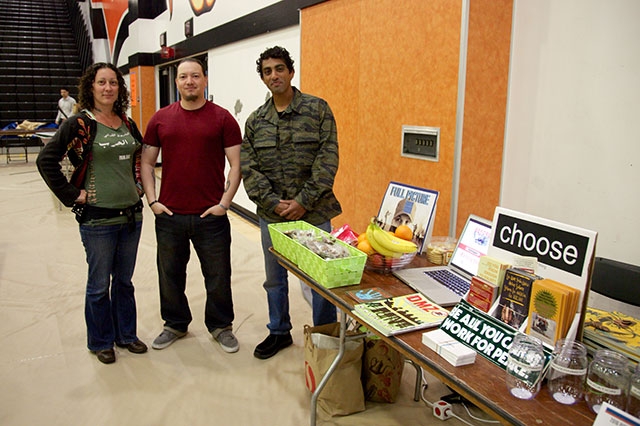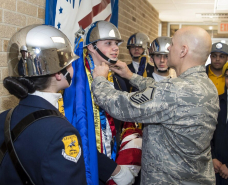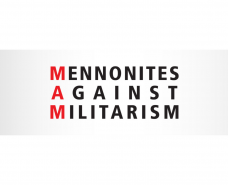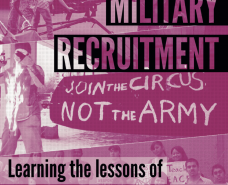Thanks for Your Service, but Don't Tell the Kids About It (We Need Them to Enlist)

By Emily Yates, Truthout | Op-Ed. Find the original article here.
"Excuse me, are you saying negative things about the military?"
The question came over my right shoulder, from a well-dressed woman whose nametag proclaimed her to be a member of the Chamber of Commerce in Pittsburg, California. We were in the Pittsburg High School gymnasium, the location of an end-of-year career fair for graduating seniors. Two other veterans and I, along with a civilian friend, were tabling there with the Full Picture Coalition, a network of individuals dedicated to bringing students the truth about military recruitment, and we'd been conversing with students for nearly two hours before the woman interrupted us to demand, with eyes narrowed, what kind of negativity we might be spreading. Alex, one of the veterans in our group (and a former Army recruiter himself), smiled at her.
"We're just telling the students about our experience, ma'am," he said. "We're veterans."
Another woman, also from the Pittsburg Chamber, approached. I recognized her as the one who'd shown us where to set up our table that morning.
"I thought you were here to tell students about corporate jobs they could get after the military," she snapped, glaring at our display of colorful pamphlets and flyers, including one titled "Questions to Ask Your Military Recruiter." "I think you need to leave."
How the Army Recruited Me
Three months after September 11, 2001, an Army recruiter called me at home. I was 19, about to finish my first semester of community college in upstate New York, and Sergeant Brown caught me at the right time: I had just found out my federal financial aid application had been denied. When Sergeant Brown asked me what I was studying in school, I sighed and told him, "Journalism … eventually." His enthusiastic response: "I can get you a journalism job in the Army!"
I was one of the lucky ones -- my recruiter never promised me I wouldn't see combat. Yet that was a common tactic, as others I met would tell me.
It wasn't a direct lie, per se. The job he got me in the Army was indeed titled "Print Journalist," and it would entail constructing content that looked, to the untrained eye, exactly like news. But the job also had a second title, and although it didn't seem strange to my 19-year-old mind at the time, over the course of my six years in the military, I would come to scorn the idea that a "journalist" and a "public affairs specialist" could be one and the same. Far from being a conveyor of factual information, I was trained to be a spinner of truthy tales, molding command information into the reassuring shape of news articles and photo essays, leaving out any bits that could reflect poorly on the Army and its mission.
Whether or not my recruiter could define the difference between journalism and public affairs, he could easily assess that his ability to successfully recruit me depended on getting me the job I wanted -- or at least, the job I thought I wanted. It didn't matter to his quota whether I realized, once enlisted, that I'd signed up for a job that would profoundly abuse my mind. Once I had shipped off to basic training, all the things he'd told me would vanish into the ether, along with any sense of personal responsibility on his part. He had carte blanche to say whatever he needed to say to keep me committed to joining the military, and after I was in, his work was done.
I was one of the lucky ones -- my recruiter never promised me I wouldn't see combat, or that I could be stationed anywhere I wanted, or that I could get out of my contract any time if I didn't like what I'd signed up for. He did promise I'd get to go to airborne school and jump out of planes, and that it would be added to my contract after basic training -- a line that got some laughs from the drill sergeants when I told them about it -- but that's nothing compared to guaranteeing a soldier they'll stay out of war. Yet that was a common tactic, as others I met would tell me.
Warning High School Students About Recruiters' Lies
The deceptive claims made by my recruiter were part of my motivation to visit high schools in lower-income towns and help educate students about the particular ways they might be misled by the recruiters in their schools' hallways. These students in particular are heavily relied upon to feed the military all the "volunteers" it needs -- as many recruiters attest, it's much easier to enlist young people who really need all the benefits the military offers them. All services require recruiters to meet a monthly quota of new enlistees. In order to meet their quotas, recruiters use all the resources at their disposal (to include an annual recruitment budget upward of $1 billion) to make the military look like the most attractive option available to high schoolers. In schools where most students are unlikely to be able to afford college, the promise of "free" tuition often does the trick.
My initial active-duty contract was for five years -- the amount of time my recruiter said I needed to enlist for in order to get the "journalism" job he'd promised.
But is the tuition really free? Are any of the benefits of military service truly free? Well, in order to receive the benefits offered, a person must serve in the military until their contract is completed, and leave the service with either an honorable or medical discharge. If they get out early, they need to have served at least two-thirds of their contract in order to access education benefits. Seems simple -- until it isn't.
When we enlist, we're given the option of choosing how long we'd like our initial contract to be -- usually three to five years. This gives us the impression that after those three to five years are done, our contract will be completed. But in the contract's fine print, if we read it carefully and understand it (which most of us don't), it specifies that every service member is obligated to serve the needs of the military for a minimum of eight years. The three to five years we sign up for are the "active" service years, and the rest of the eight are spent in the Inactive Ready Reserve, meaning that any time within those eight years, even if service members have been discharged, they can be called back to serve on active duty if needed. Recruiters never seem to bring this up.
My initial active-duty contract was for five years -- the amount of time my recruiter said I needed to enlist for in order to get the "journalism" job he'd promised. After four-and-a-half years, with one year-long Iraq deployment under my belt, I was more than ready to get out. The problem was, the US was still at war -- and the Army was understaffed. To help mitigate the problem, a policy called "stop-loss" had gone into effect. This allowed the military to indefinitely extend the contract of anyone it deemed necessary to the mission, and that, to my dismay, included me. So instead of getting off active duty in June 2007 as planned, I was kept in, and deployed again to Iraq in March 2007, this time for "12 to 18 months."
The Danger of Post-Traumatic Stress
The first deployment had been challenging, but expected -- even embraced, as I felt I was finally going to get to report on the war. But after a year of churning out one positive story after another while surrounded by nothing resembling positivity, my disillusionment was at an all-time high, and all I wanted -- desperately -- was to get out and move on with my life, which was a mess after a year in Baghdad and less than a year back home. The second deployment was unexpected, and those 14 months I spent in Baghdad were some of the most challenging. The constantly incoming rockets and mortars that kept exploding on our base were the least of my worries -- physically, I was in decent shape, but mentally, I came undone. My marriage (to a fellow soldier I'd met in our shared barracks), which had barely remained intact after my first deployment, fell apart entirely. My supervisors were deceptive, my job was to deceive and my chosen methods of coping (secretly acquiring alcohol and consuming it in vast quantities while engaging in ill-advised affairs) were destructive. A few weeks before going home, I was sexually assaulted by two fellow soldiers I'd thought of as friends, but kept it quiet because I knew there was no way to prove it. I became dependent on Ambien, generously prescribed by the headquarters doctor, to help me sleep. I trusted no one.
By the time I finally got out of the military, six years after enlisting, I hardly had a clue which way was up.
By the time I finally got out of the military, six years after enlisting, I hardly had a clue which way was up. To make matters worse, I'd only had three weeks to get all my out-processing done after getting back from Iraq, due to the stop-loss policy's having extended my contract so long that it threatened to overlap with my accrued days of leave. That meant less than a month after returning from Baghdad, I was entirely on my own, for the first time in my adult life. It would be three years before my post-traumatic stress was diagnosed, but in the interim, its symptoms ruled my life. I drove around the country alone and aimlessly, feeling isolated with my battle buddies few and far between, and drank excessively in an attempt to feel comfortable with my new civilian friends, who had no idea what was going on in Iraq. Far from being proud of my military service, I felt ashamed of it -- it had been my job to help make it look like we were winning the war, an act I felt was neither noble nor honorable, despite what my discharge paperwork said.
I felt like my youth had been misspent, my mind broken and my good intentions abused. I was angry at the military and angry with myself for getting sucked into it. I was angry with my civilian friends for being so far removed from the wars that they didn't ask about my experience and seemed to expect me to be fine -- but I wasn't fine. I'd been trained as a soldier, but hated mindless aggression. I'd been trained in the technical skills of journalism, but I no longer wanted to be a journalist, as I'd become convinced that to do so was to be forcibly biased. I'd been trained in the technical skills of public relations, but was in no shape to work a job that required tact. I swung back and forth between disgruntled and depressed, distracting myself with as much festive debauchery as I could find. It wasn't until I was introduced to a group called Iraq Veterans Against the War that I found a community of other veterans who felt as angry as I did, and through them, found a way to channel my anger into action. With Iraq Veterans Against the War and its civilian allies, I began working to inform others about the inhumane wars in Iraq and Afghanistan, and to organize against them.
To help myself heal from this moral injury and trauma, I was compelled to go to the youth and tell them what their recruiters never would -- that the benefits of military service are never free.
Eventually, I did access my education benefits -- I went back to school to study the Middle East, and the history of US involvement there. I earned my bachelor's degree, 12 years after enlisting on a five-year contract that lasted six years, during which I was physically and psychologically abused by those I was told to trust. I got my "free" college, after two deployments to a country that should never have been invaded, after years of volunteer work to overcome the shame of my job: intentionally misleading my fellow soldiers about the nature of the war.
The "Benefits" of Military Service Are Never Free
To help myself heal from this moral injury and trauma, I committed to helping young people understand just what they were getting into when they joined the military for all those "free" benefits -- because I'd been one of the lucky ones, who made it home alive, with all my limbs and many of my faculties intact.
I felt I owed this service to those who didn't have the same luck, who couldn't come back and tell anyone about what they'd been through because they were dead or drunk or disabled or struggling to survive. For those whose post-traumatic stress led to behavior that got them kicked out of the military rather than treated for their trauma; who ended up with dishonorable or bad-conduct discharges that led to the revocation of their benefits; who killed themselves rather than face a lifetime of pain and alienation, I was compelled to go to the youth and tell them what their recruiters never would -- that the benefits of military service are never free. We pay the price for the rest of our lives.
The women from the Pittsburg Chamber of Commerce couldn't know that, though, and they didn't want to know. They stood over us with arms crossed as we packed up our table. One of them repeatedly insisted that her husband had been in the military, and he'd been fine, and now her daughter had just enlisted.
"I hope she doesn't get raped," I replied with too much anger, the indignant anger I'd been struggling to overcome for years, but which still surfaced when prodded by willful ignorance such as this. It was clear they were uninterested in hearing anything "negative" about the military, no matter how appreciative the students were of our efforts to bring them a few morsels of truth. Their denial was deep and untouchable. As we left the building, I looked back at the military recruiters standing at their tables in the front, and I saw them smirk. They would meet their quota. I felt the rage bubble up in my chest, and with it, the understanding that my work would never be done. But I was one of the lucky ones.
Photo:Emily, Alex and Rishi, all post-9/11 veterans, prepare to talk to students about military recruitment and their experiences in the Army and Marine Corps, at the Pittsburg High School career fair on May 25. (Credit: Siri Margerin) | Source: TruthOut
Countering Military Recruitment

WRI's new booklet, Countering Military Recruitment: Learning the lessons of counter-recruitment campaigns internationally, is out now. The booklet includes examples of campaigning against youth militarisation across different countries with the contribution of grassroot activists.
You can order a paperback version here.








